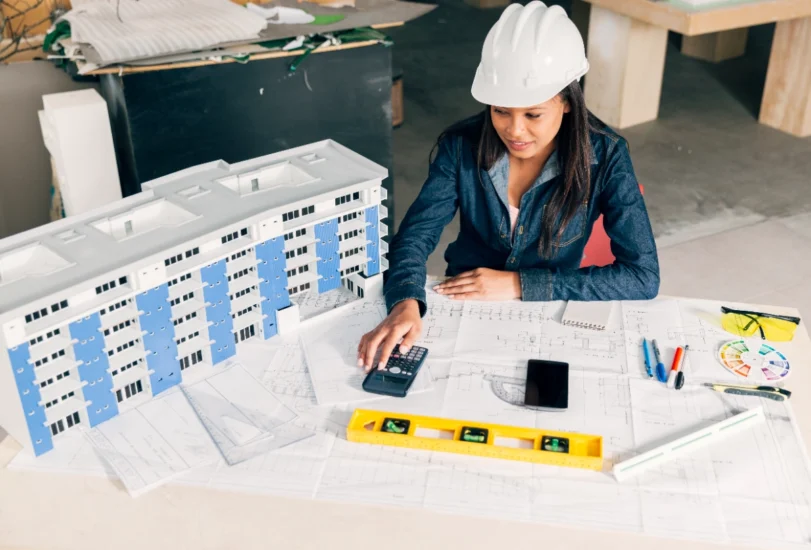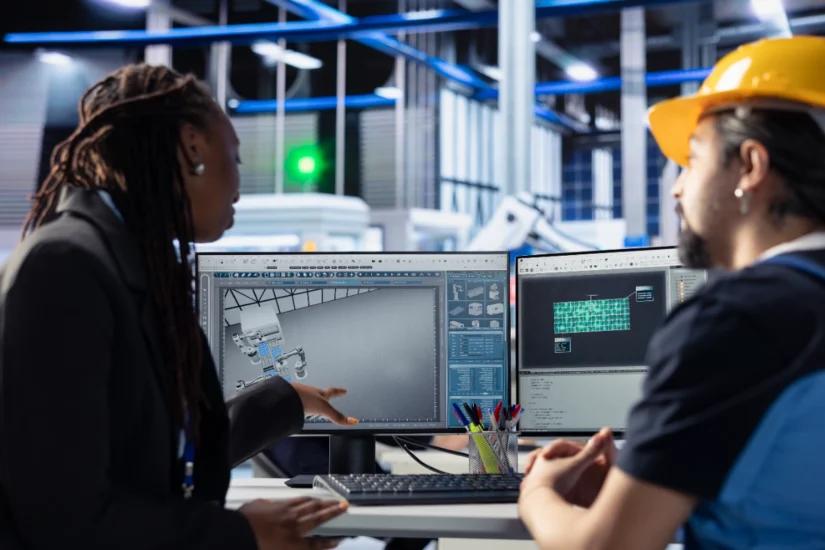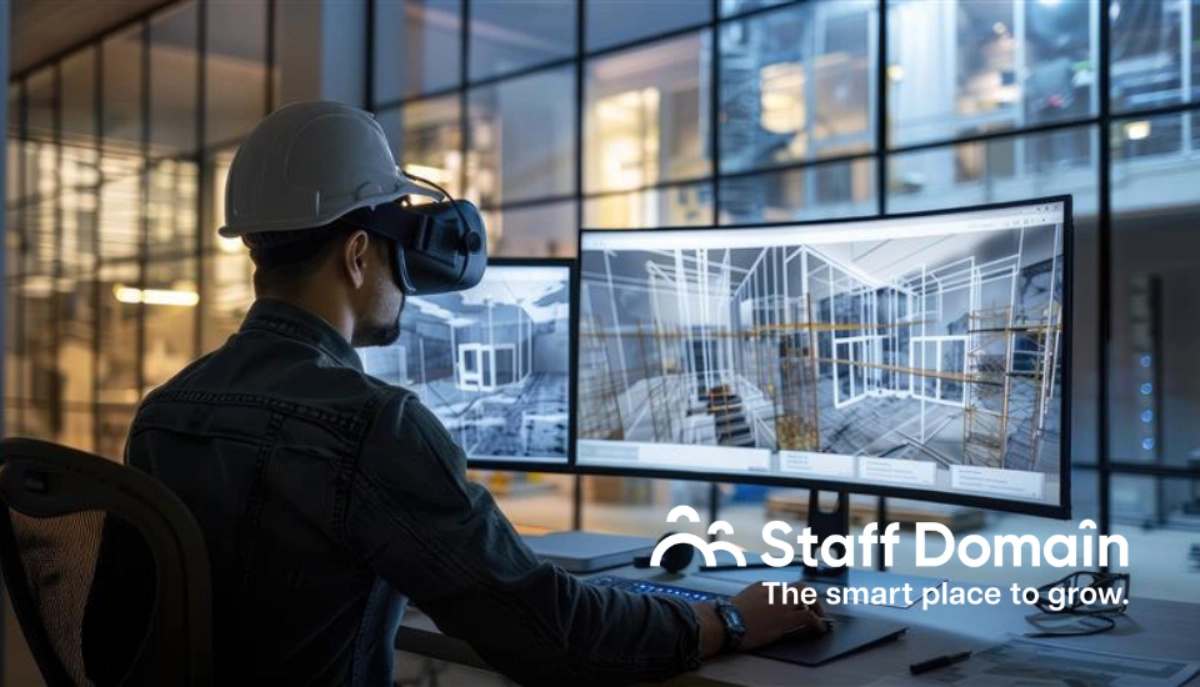AI potential in construction with offshoring is transforming how Australian firms plan, design, and deliver projects. With technologies like Artificial Intelligence (AI) and Building Information Modelling (BIM) gaining momentum, the industry is moving towards smarter, more efficient workflows.
AI supports predictive analytics, risk mitigation, and automation, while BIM enhances collaboration and accuracy through 3D modelling. Together, they offer significant productivity gains—but a shortage of local digital talent is slowing adoption.
Offshoring provides a practical solution. By accessing skilled professionals globally, companies can deploy AI and BIM faster and more affordably, gaining a competitive edge without stretching internal resources.
How AI and BIM Are Reshaping the Construction Industry

The AI potential in Construction with offshoring becomes clear when we examine how technologies like AI and BIM are transforming the way projects are designed, coordinated, and delivered. AI supports automated scheduling, risk prediction, and real-time decision-making—leading to greater accuracy and fewer delays. BIM, meanwhile, allows for integrated planning using intelligent 3D models that align architecture, engineering, and construction efforts.
According to BuildingSMART, BIM improves project delivery by enhancing collaboration, reducing rework, and increasing overall efficiency across construction lifecycles. These advantages are critical as companies strive to keep up with complex infrastructure demands and rising client expectations.
A standout example is Australia’s first multi-storey 3D printed house, which demonstrates how technology and outsourcing can combine to deliver future-forward, cost-efficient solutions. This project proves that with the right talent and tools—onshore or offshore—innovation is not just possible, it’s scalable.
Offshoring AI and BIM roles enables construction firms to tap into a global pool of experienced professionals who are ready to implement these tools immediately, helping companies fast-track their digital transformation without straining internal resources.
The Digital Skills Shortage Holding the Industry Back

Despite the growing AI potential in construction with offshoring, many Australian firms still struggle to adopt digital technologies at scale due to a shortage of skilled local professionals. AI and BIM may be readily available, but without the people to implement and manage these tools, their benefits remain out of reach.
Why the Talent Gap Persists in Australia
Several long-standing issues contribute to this shortage:
- Limited talent pipeline – Tertiary institutions aren’t producing enough AI and BIM-ready professionals.
- Heavy cross-industry demand – Construction competes with IT, finance, and government sectors for the same talent.
- High local labour costs – Skilled digital professionals command premium salaries, often exceeding mid-sized construction budgets.
As AI and BIM adoption becomes more urgent, the inability to hire fast—and affordably—can delay projects and weaken a company’s competitive edge.
This broader labour challenge has already prompted many businesses to consider offshoring as a strategic response to Australia’s construction workforce gaps.
Offshoring: A Smart Solution to a Pressing Problem
Offshoring offers more than cost relief, it delivers capability. By tapping into global talent, businesses can:
- Access experienced AI and BIM professionals without recruitment delays
- Scale teams efficiently for both short-term projects and long-term growth
- Avoid over-reliance on limited local hiring pools
- Begin digital implementation immediately, improving delivery speed and project outcomes
This is exactly where the AI potential in construction with offshoring becomes a game changer. It removes barriers to digital transformation and empowers firms to build smarter, faster, and more sustainably, without compromising on quality or innovation.
Offshore Talent as a Strategic Enabler

Offshore professionals bring more than just extra hands—they bring focused expertise, international experience, and the technical know-how to drive digital transformation in construction. These specialists can seamlessly integrate into Australian teams, contributing to everything from project design and modelling to data analysis and AI implementation.
By hiring offshore, companies can build resilient, future-ready teams equipped to work with cutting-edge tools like BIM and AI. This is particularly valuable as digital demands increase across government infrastructure projects, commercial developments, and green building initiatives.
Tapping into the AI potential in construction with offshoring gives businesses a faster, more cost-effective way to adopt emerging technologies without the typical recruitment delays.
High-Impact Roles to Offshore
These roles are in high demand and highly suitable for offshoring:
- BIM Specialists – for advanced modelling, clash detection, and coordination
- AI Data Analysts – interpreting real-time project data for faster decisions
- Digital Project Coordinators – streamlining workflows across platforms like Procore or PlanGrid
- 3D Rendering Experts – visualising projects before ground is broken
- Automation Engineers – implementing robotics and smart construction systems
Carrera by Design: Scaling Smart with Offshore Support
One company that illustrates this strategic approach is Carrera by Design, a leader in bespoke joinery and interior design. Starting with just one drafter, Carrera built a five-member offshore team with Staff Domain to support both the design and production phases of its projects.
The offshore team integrated seamlessly with their Sydney-based operations, even travelling onsite to enhance collaboration and understand the physical manufacturing process. This alignment allowed Carrera to scale operations while maintaining the quality and craftsmanship they’re known for, proving that offshoring isn’t just about saving money, it’s about building smarter.
Strategic Wins That Build Competitive Advantage
Instead of repeating cost-saving points, consider the broader strategic gains:
- Technology onboarding made easier – offshore staff come in with the proficiency required when using the latest tools
- Business continuity – with distributed teams, work doesn’t stop due to local disruptions
- Access to global construction trends – many offshore professionals work across international projects
- Enhanced digital maturity – faster adoption of digital systems across your workforce
- Talent retention – skilled offshore staff often show strong loyalty and lower turnover
Offshoring isn’t just a tactical decision—it’s a long-term investment in your company’s ability to deliver smarter, faster, and more innovative builds.
Conclusion: The Future of Construction is Global and Digital

As the construction industry evolves, embracing digital tools is no longer optional—it’s essential. AI and BIM are leading this shift, helping businesses reduce waste, improve precision, and complete projects faster. But without the right people to implement and manage these technologies, their full potential is left untapped.
Offshoring offers more than just a solution to the skills shortage. It’s a strategic move that allows Australian companies to access specialised talent, scale efficiently, and remain competitive in a fast-changing landscape. Teams that understand AI potential in construction with offshoring are already leading the way, delivering smarter outcomes and driving innovation across the built environment.
Whether you’re a small firm taking the first step into digital construction or a large contractor scaling for multiple projects, the right offshore talent can help you achieve more—faster and with confidence.
Staff Domain’s offshore outsourcing solutions connect your business to a highly experienced global talent pool for game-changing results. Effortlessly manage your offshore workforce with our comprehensive compliance, payroll, and HR support, and benefit from fixed, transparent pricing in your local currency. Contact us today or schedule a meeting with our sales team to quickly source the right offshore team for your business.
Frequently Asked Questions: AI Potential in Construction with Offshoring
1. What is the AI potential in construction with offshoring?
The AI potential in construction with offshoring lies in accessing global talent who can develop and apply artificial intelligence tools to automate workflows, analyse data, and improve decision-making. Offshore AI specialists help construction companies implement smart solutions without the long wait or high costs associated with local recruitment.
2. How does offshoring accelerate AI adoption in construction?
Offshoring allows construction firms to bypass talent shortages and onboard experienced AI professionals who are ready to deploy solutions like predictive analytics, machine learning for project risk detection, and computer vision for site monitoring. This speeds up digital transformation and improves project outcomes.
3. What AI-related tasks can offshore teams support in construction projects?
Offshore AI experts can contribute to:
- Predictive maintenance scheduling
- Risk analysis and mitigation modelling
- Material optimisation and cost forecasting
- Image recognition for site safety compliance
- Automation of repetitive project tasks
These applications unlock major efficiency and cost-saving opportunities across the project lifecycle.
4. Is offshoring AI talent suitable for small to mid-sized construction firms?
Yes. In fact, offshoring makes AI more accessible to smaller construction businesses by removing barriers like high local salaries and limited talent availability. It offers a scalable, affordable way to explore AI capabilities without overextending internal resources.








